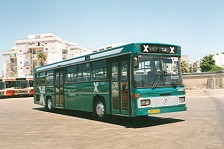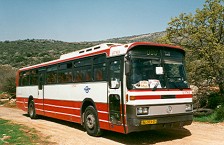Baka Revolt
 This is Derech Hevron (Hebron Way). As the picture (courtesy of Jerusalem Shots) attests, it is a major boulevard and traffic arterial carrying thousands of commuters into downtown Jerusalem daily. I've told folks before that the most dangerous part of living in Jerusalem is our daily crossing of Derech Hevron from its eastern sidewalk, over it's bus islands and onto the western sidewalk.
This is Derech Hevron (Hebron Way). As the picture (courtesy of Jerusalem Shots) attests, it is a major boulevard and traffic arterial carrying thousands of commuters into downtown Jerusalem daily. I've told folks before that the most dangerous part of living in Jerusalem is our daily crossing of Derech Hevron from its eastern sidewalk, over it's bus islands and onto the western sidewalk.Derech Hevron is designed for both cars and public transporation. The cars take the outer lanes while the buses and taxis and sheruts use the center lanes, divided from the car lanes by long concrete islands topped by fences. The car traffic is unbelievably heavy in the mornings--bumper-to-bumper, three lanes wide, much jockeying of positions, short tempers, no patience.....
My husband and I walk our son to the Ulpan For Teens in Baka. We chose our rented apartment in part because of its proximity to the ulpan. Our son is vision-impaired so we're not prepared to turn him loose to cross Derech Hevron by himself. Lots of the children in his ulpan, as well as the children who attend Pelech and Efrat schools, must cross Derech Hevron daily, braving the tired and impatient commuters who routinely park across the cross-walks, and shout at these child pedestrians who are crossing WITH the light but impeding the drivers' forward creep into the next half-meter of lane that has opened up. Drivers are understandably impatient in gridlock but also inattentive when moving at only 5 kph....some talk on their cell phones, some read the newspaper, some chat with passengers but none of them is particularly attentive to the school children, the lights, or the cross-walks.
The City of Jerusalem is putting in a light rail system, which we think is a fabulous idea. However, in planning the light rail, the City decided to close off the northern stretch of Derech Hevron to automobile traffic and make the road beyond Naomi Street (upper Abu Tor and the road to the Old City) a route for mass transit vehicles only.
The alternate route for the private vehicles was to be a road built through the long-defunct and virtually empty former Ottoman train yard between Derech Hevron and Derech Bet Lechem (Bethlehem Way). This sensible solution was axed by some presumably corrupt or idiotic planner in the City government who decided to use the abandoned rail yards for a luxury apartment complex and reroute Derech Hevron's three over-crowded lanes of morning commute traffic onto Derech Bet Lechem. I favor the 'corrupt' theory since no one with any planning experience could make such a mistake, and the fact is that shady real estate deals abound in Jerusalem's city governance.
Derech Bet Lechem is a very narrow, tree-shrouded two-lane arterial that is the heart of the Baka area. All the tiny little walking lanes and car alleys (laughably called roads) that constitute our neighborhood run off of Derech Bet Lechem; the 7 bus only runs up Derech Bet Lechem north-bound to the city, since the road isn't wide enough for two-directional bus travel. The main 'shopping area' is a row of shops running about four blocks from just below Yehuda up to Hananiya. The neighborhood is alive with walkers, since driving isn't practical given the narrow roads and lack of parking. At any time of day or night, one can walk through Baka and see our neighbors walking to Kulo, our local excellent coffee shop/restaurant for a meal or just coffee, to the produce markets for last-minute vegetables, to the small makolets (small markets--tiendas for my California friends) for milk, to the pharmacy which is opened until 11 pm, or just out strolling with one's teens, one's spouse or one's dog.
This is the street which the City has decided will absorb the traffic from Derech Bet Lechem and become the new major arterial into downtown Jerusalem.
Some City politico no doubt just looked at a map and said, "Hey, look, here's another boulevard that goes downtown--let's use it!" without ever venturing out of his office to actually LOOK at the road. That's the only possible explanation because no one with a brain in his head would actually think you could divert three lanes of gridlocked Derech Hevron onto Derech Bet Lechem at all much less think this is any kind of solution to the morning traffic nightmare.
Derech Hevron at least has cross-walks controlled (badly) by signals for pedestrians to cross. The fact that none of these walk/don't walk signals is coordinated for pedestrians is another issue--one cannot successfully cross Derech Hevron with the walk signals unless one is an Olympic sprinter.
Derech Bet Lechem has no traffic lights or walk/don't walk signals so all of the ulpan teens, the local high school and elementary students girls, or any child or adult wanting to walk to the local library will, in the future, be braving the morning traffic rage of ever-more-gridlocked drivers on Derech Bet Lechem without any traffic controls which will assist their safe crossing of the street.
The City claims that it got the approval of the Baka local community council--which is technically true; but what is left out of the Jerusalem Post article (link in the title above) is that the local council said they were never given the tools to interpret the governmentspeak gobblygook that was thrown at them, and were given verbal reassurances that this would "improve" Baka, not destroy it.
Derech Bet Lechem is the heart of a small village here--the City's thoughtless plan to reroute its traffic gridlock from Derech Hevron to Derech Bet Lechem does nothing for the citizens of this community. Instead, it destroys the many small businesses both on Derech Bet Lechem (no parking will be allowed) and lower Derech Hevron; it increases the traffic danger to our neighbors, especially children, crossing the streets to go to school, or shop; it enriches someone with "protexia" at City Hall who quashed the alternate roadway so he could get rich off a new apartment complex.
 For now, the neighborhood is trying to petition City Hall to rethink this disaster. If real estate money, croneyism and recidivist thinking prevail, nothing will change. Then the people of Baka need to take a lesson from the Parisians and their latter day immitators in Mea Shearim: block off Derech Bet Lechem every morning with parked cars, burning tires and dumpsters! If the City can bring itself to cave in to that kind of pressure over a parade, then maybe they'll take a neighborhood revolt over traffic dangers seriously. To The Barricades!
For now, the neighborhood is trying to petition City Hall to rethink this disaster. If real estate money, croneyism and recidivist thinking prevail, nothing will change. Then the people of Baka need to take a lesson from the Parisians and their latter day immitators in Mea Shearim: block off Derech Bet Lechem every morning with parked cars, burning tires and dumpsters! If the City can bring itself to cave in to that kind of pressure over a parade, then maybe they'll take a neighborhood revolt over traffic dangers seriously. To The Barricades!







